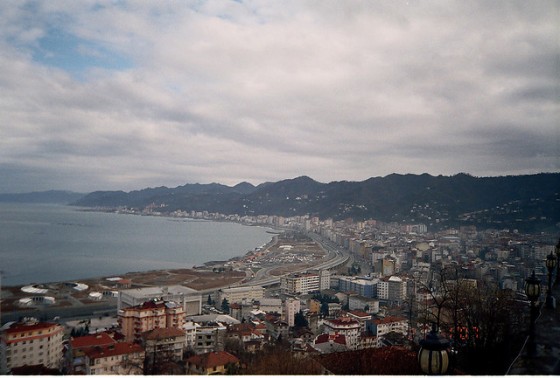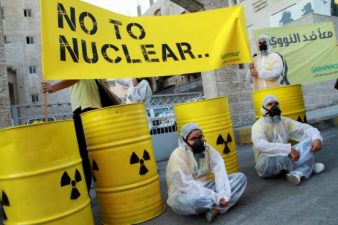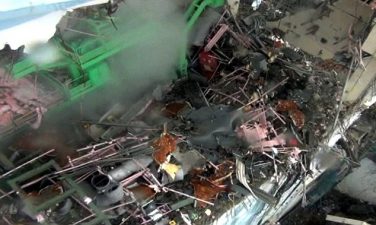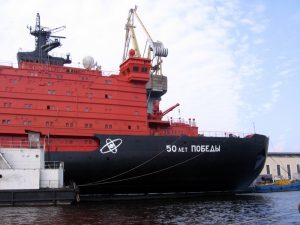 The Black Sea province of Rize is synonymous with tea production in Turkey. After the Chernobyl nuclear meltdown, the Turkish government tried to avoid testing the area for radioactivity, and encouraged Turks to continue drinking Rize tea.
The Black Sea province of Rize is synonymous with tea production in Turkey. After the Chernobyl nuclear meltdown, the Turkish government tried to avoid testing the area for radioactivity, and encouraged Turks to continue drinking Rize tea.
As the news from Japan gets worse and worse — only one month ago it was announced that three of the nuclear reactors at Fukushima had melted down — attention is turning to parts of the world that have already undergone nuclear disasters. In a recent interview, renowned pediatrician and nuclear energy expert Dr. Helen Caldicott compared the Fukushima disaster to the Chernobyl nuclear meltdown of 1986, noting that Chernobyl was directly responsible for at least 20,000 cancer cases and blighted crops for hundreds of kilometres around.
In Turkey, particularly regions around the Black Sea coast, at least two years of crops were completely ruined. The government’s efforts to hide the truth from Turks, however, were equally insidious, according to Alidost Numan of Greenpeace Mediterranean.
The cover-up
After Chernobyl, the Turkish government tried to prevent studies from being conducted on the radioactivity levels and cancer rates in areas around the Black Sea, Numan told Green Prophet in a recent interview.
Government officials went to absurd lengths to convince the Turkish public that produce from the Black Sea region was still safe to consume, Numan says.
Although Turkish farmers could not sell hazelnuts internationally, they were given out in school lunches. Government ministers went on television to drink tea from the northern province of Rize to prove to viewers that it was still safe. The environment minister of the time even rubbed tea on his face at a press conference. In 1987, one year after the blast, the Turkish Atomic Energy Agency declared the tea harmless.
The reality
Numan’s points were echoed in an article that Turkish paper Hurriyet Daily News published in March. According to İnci Gökmen, a chemistry professor at Ankara’s prestigious Middle East Technical University, an analysis team found 10,000 Becquerel rays in each kilogram of Rize tea. That far exceeds the 300-Becquerel-rays-per-metric-cube radiation limit that the World Health Organization deemed appropriate in 2009.
The effects of the radiation were more visible in populations along the Black Sea. A doctor in the Turkish Chamber of Physicians who worked in a small town in Rize told the Hurriyet Daily News that, between 1988 and 1990, cancer rates and abnormal births spiked.
“We saw babies born without arms and legs,” he told the Daily News. And even today, Black Sea towns have much higher cancer rates than other parts of Turkey.
The impact
In her recent interview, Caldicott declared that all Turkish agriculture is still tainted and should not be consumed. While this is a far stronger line than any governments or international health organizations have taken, Chernobyl undeniably left a very dark mark on Turkish towns around the Black Sea.
According to Numan, the government’s flippant attitude and attempts to cover up the magnitude of the radiation made many Turks less trusting of their government. “The Turkish population realized suddenly that no one was watching their health,” he says.
But generations born since that time don’t have the same skepticism — a fact which especially worries Numan now, as the Turkish government appears on the brink of constructing Turkey’s first nuclear plant. It’s time for a history lesson in Turkey. Unfortunately, Japan might be the primary example.
Read more about nuclear energy:
Dr. Helen Caldicott: Fukushima Nuclear Meltdown Much Worse Than Chernobyl
“Worst Case Scenario” Realized As Three Fukushima Nuclear Reactors Melt Down
Despite Japan, Turkey Goes Ahead With Nuclear Reactors
Image via mutafi




In my opinion no one belives you. Buy a geiger counter; I have a bag of Turkish apricots for you to test.
As you know that Chernobyl accident occurred on 26 April 1986. Due to this diseaster, not only neighbours of Ukrain like Moldovia, Russia, Romania, Belarus but also transmarine countries like Turkey were affected by radioactivity released.But I couldn’t understand why you try to express that Turkish agricultural products are still under threat of radioactivity. Our products are absolutely safety according to the scientific data.Please make correction about our products.Otherwise you have to prove your claim scientifically !